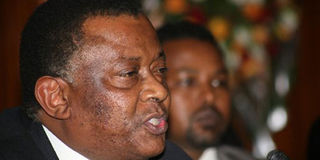CoE ‘to blame for lack of clarity’ on poll date

Committee of Experts on Constitutional Review chairman Nzamba Kitonga. Photo/FILE
The sharp reactions on the date of the next elections could have been avoided if the Committee of Experts that drafted the new Constitution had clearly stated when the first polls would be held.
The High Court did not help matters by failing to determine the exact date in its January ruling and instead passed the ball to the President and Prime Minister and the Independent Electoral and Boundaries Commission (IEBC).
The lack of clarity led to varied interpretations on whether elections shall be in August 2012, December 2012 or March 2013.
Nairobi lawyer J.M. Waiganjo said that although the Constitution envisages the second Tuesday of August as the date of elections, the IEBC has all along indicated that that would be impractical.
“The confusion would not have been there if there was no ambiguity on the date for the first election under the new Constitution,” Mr Waiganjo said.
Curiously, former members of the Committee of Experts (CoE) have been divided over the matter, writing articles in the media offering varying interpretations.
Former CoE commissioner Otiende Amollo, now the Ombudsman, insists that, both in intent and design, the experts wanted the first elections under the new Constitution held towards the end of December 2012 as has been the practice in recent times.
“It is not that we were not clear,” Mr Amollo told the Sunday Nation on Saturday.
He said that although the Constitution put the second Tuesday of August 2012 as the date of elections, sections relating to Representation, Legislature and the Executive are suspended until the final announcement of all the results of the first elections for Parliament.
Mr Amollo said the confusion over the date arose from powers of the President to dissolve Parliament under the old law.
He said the CoE did not come up with a specific date for the first elections because, under the old constitution, there was no specific date set and that the polls were always held in December.
Mr Amollo said the High Court was wrong in stating that the elections could be held next year, adding that it should have been in December.
“It is unfortunate the Independent Electoral and Boundaries Commission has gone ahead with the decision yet it has not been properly sorted out in the Court of Appeal and Supreme Court.
We might end up with different conclusions,” Mr Amollo said.
Senior counsel Paul Muite said the court’s decision would be the final interpretation of the law and that the two principals should have followed it and agreed on when to dissolve the grand coalition government.
“The IEBC moved to set the date after the President and the Prime Minister refused to say whether or not they were going to dissolve the coalition. By keeping quiet they have forced the electoral commission to fix the date,” Mr Muite said. Knowing the polls date is part of free and fair elections, he added.
In an opinion piece in the Nation earlier in the year, law scholars Prof Yash Pal Ghai and Jill Cottrell Ghai argued that poor draftsmanship by the COE had left the nation facing a dilemma over the election date.
“The Revised Harmonised Draft included a major change from the Harmonised Draft: it assumed parliament might be dissolved early. Apparently the CoE failed to realise it had removed the presidential power to dissolve parliament – and said the president could ‘only’ dissolve with the agreement of the prime minister. Unfortunately this is not the only error by the CoE—others may come to haunt us.”




